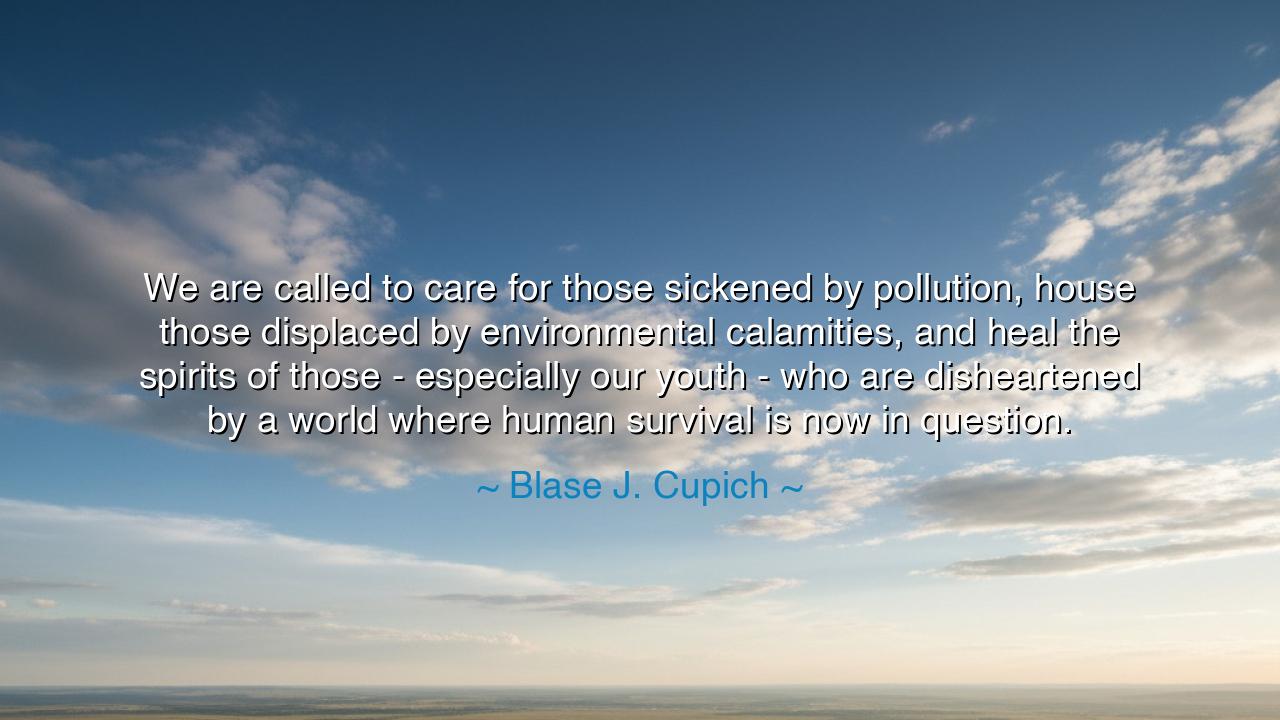
We are called to care for those sickened by pollution, house
We are called to care for those sickened by pollution, house those displaced by environmental calamities, and heal the spirits of those - especially our youth - who are disheartened by a world where human survival is now in question.






The words of Blase J. Cupich rise like a pastoral call across the troubled fields of our age: “We are called to care for those sickened by pollution, house those displaced by environmental calamities, and heal the spirits of those—especially our youth—who are disheartened by a world where human survival is now in question.” This is not the language of mere policy or philosophy; it is the cry of conscience, summoning us to recognize that the wounds of the earth are also the wounds of humanity. For when the air is poisoned, bodies falter; when the seas rise, homes vanish; and when the horizon darkens, the hearts of the young grow heavy with despair.
At its heart, this teaching reminds us that the environmental crisis is not only ecological but profoundly human. The sickness of the earth is mirrored in the sickness of the people. Those who breathe the smog-laden air bear its weight in their lungs. Those who live on fragile coasts watch as floods swallow their dwellings. And those who gaze upon a burning planet feel their spirits weakened, especially the young, who must wonder whether the world they inherit will sustain their lives or betray their hopes. Cupich insists that our duty is not only to mend the soil and sky but to care, house, and heal—to tend the flesh, the shelter, and the soul.
History offers us solemn reminders of these truths. When the Dust Bowl struck the American plains in the 1930s, families were driven from their lands, coughing on dust storms that blotted out the sun. Farmers and children alike were sickened by the earth’s devastation. Thousands migrated westward, their spirits weighed down by hunger and uncertainty. Their plight was not just agricultural; it was human, social, and spiritual. It was neighbors and communities, churches and charities, that offered them care, housing, and hope. In this, we see the eternal pattern: when the earth trembles, it is the people who fall, and when people fall, only compassion can lift them again.
Cupich’s words also touch upon the youth, whose burden is perhaps the heaviest of all. For they are the inheritors of tomorrow, yet many grow up in a world clouded by warnings of climate collapse, rising seas, and vanishing forests. Their despair is real, for when survival itself seems uncertain, ambition falters and joy fades. To heal the spirit of the young is therefore as urgent as to clean the rivers or mend the atmosphere. They must be given not only knowledge of the crisis but also courage to confront it, and assurance that their hands can build a future worth living.
The teaching is deeply moral and profoundly spiritual: we are not bystanders in this unfolding tragedy, but caretakers and healers. Just as the Good Samaritan did not pass by the wounded on the road, so too must we not avert our eyes from those sickened by pollution or displaced by calamity. Compassion demands that we extend beyond sympathy into action—building shelters, providing medical care, lifting hearts, and binding communities. To ignore this call is to betray both our neighbor and our descendants.
The lesson, then, is this: the survival of humanity is bound together with the survival of the earth, and our response must be both practical and compassionate. Each of us has a role—whether in reducing harm, supporting those already afflicted, or inspiring the next generation to hope rather than despair. We must not only fight for clean air and stable climates but also for the dignity of those who suffer now, in this present moment, as victims of pollution, displacement, and fear.
Therefore, children of tomorrow, take Cupich’s words as both warning and commission: be the caretakers of the sick, the builders of refuge for the displaced, the encouragers of the young. Let your work heal both earth and soul. For if survival is in question, then compassion is the answer; if despair rises, then hope must rise higher. Only when humanity embraces this sacred duty will the world be not merely endured, but renewed.






AAdministratorAdministrator
Welcome, honored guests. Please leave a comment, we will respond soon